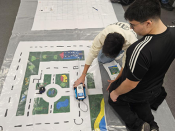Por Lourdes Morillas (cE3c/FCUL).
Terrestrial ecosystems are usually subjected to multiple environmental changes that can interact in their impacts on ecosystem services, producing non-additive effects that are unpredictable from single-factor studies. Great efforts have been devoted to disentangle the effects of a single global change driver on ecosystems, whereas we still have a scarce knowledge on how the interaction among these drivers will affect ecosystem functioning. Thus, the scientific community has highlighted the need for carrying out more empirical studies on the interaction among drivers to reduce model uncertainty on the impacts of global environmental changes. Two of the most challenging drivers of global change are the increasing atmospheric nitrogen deposition, due to fossil fuel combustion, fertilizer production and exacerbation of agricultural production and global climate change. Many studies have demonstrated that both increased nitrogen inputs and changed precipitation patterns can have severe consequences on ecosystems processes and the services they provide. However, few studies have addressed interactions between these critical drivers of global change.
The Mediterranean Basin is projected to experience an increased aridity and important changes in the rainfall dynamics with longer dry periods, while nitrogen inputs are expected to increase from the 7 kg N ha-1 yr-1 of mid-1990s to 12 kg N ha-1 yr-1 in 2050. Despite the great impact of the ongoing global change on these ecosystems and their acknowledgment as hot-spots of biodiversity, experts have pointed out the surprisingly low number of studies addressing the potential effects of nitrogen deposition on the ecosystem processes in these areas, not to mention the lack of studies on its interaction with climate change. Therefore, there is an urgent need to improve our knowledge on how enhanced nitrogen deposition and changes in precipitation pattern will affect ecosystem functioning in the Mediterranean Basin.
The biological soil crust is variably composed of soil lichens, cyanobacteria, algae, mosses, bacteria and fungi and typically dominates plant interspaces in these ecosystems. This complex component has been acknowledged as a key factor in soil processes in Mediterranean ecosystems during the last decade due to its crucial role in providing ecosystem services as nutrient cycling, carbon and nitrogen fixation, soil surface protection from erosion, and as part of biotic interactions. Moreover, lichens are amongst the most sensitive organisms to environmental changes at the ecosystem level. Their poikilohydric nature (highly dependent on the atmosphere for water supply), their differential response to N status depending on their functional response group (i.e. oligotrophic vs. nitrophytic species) and their ubiquity in these ecosystems underlie their potential as indicators of both nitrogen deposition and climate change.






















